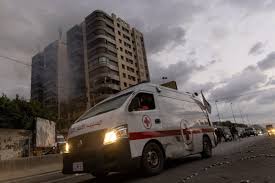
Lebanon Faces Global Crisis with the Deadliest Attacks on Health Care
Since October 7, 2023, Lebanon has recorded a staggering 47% fatality rate in attacks on health care, with 65 of 137 incidents resulting in the death of at least one health worker or patient. This percentage is the highest in any active conflict worldwide, far exceeding the global average of 13.3%.
The stark contrast is evident when comparing Lebanon's figures to other conflict zones. In the occupied Palestinian territory (oPt), for instance, only 9.6% of health care attacks resulted in fatalities. The grim toll in Lebanon includes 226 deaths and 199 injuries among health workers and patients between October 2023 and November 2024, according to data from the Surveillance System for Attacks on Health Care (SSA).
Health Care Under Fire
A combined total of 1,401 attacks on health care were reported in Lebanon, oPt, and Israel during this period, with 1,196 in oPt, 137 in Lebanon, and 68 in Israel. In Lebanon, most attacks disproportionately targeted health workers (68%), with 63% affecting health transport and 26% impacting health facilities.
“These figures reveal an extremely worrying pattern,” said Dr. Abdinasir Abubakar, WHO Representative in Lebanon. “Depriving civilians of access to lifesaving care and targeting health providers is a breach of international humanitarian law. Indiscriminate attacks on health care violate human rights and international law – this cannot become the new normal, not in Gaza, not in Lebanon, nowhere.”
The Far-Reaching Impact
The toll of attacks on health care extends far beyond immediate casualties. Destroyed health facilities and the loss of medical personnel ripple through communities, leaving the injured untreated, routine care disrupted, and public health programs, such as immunizations, abandoned.
“Casualty numbers among health workers of this scope would debilitate any country, not just Lebanon,” noted Dr. Abubakar. “What the numbers cannot convey is the long-term impact – missed treatments for health conditions, the absence of maternal and reproductive health care, undiagnosed diseases, and ultimately, lives lost because health care is unavailable.”
Health System on the Brink
Lebanon, a lower middle-income country with an advanced health system, has faced compounding crises in recent years. The escalation of hostilities since September 2024 has further strained the country’s already overburdened health care infrastructure.
Today, 1 in 10 hospitals in Lebanon has been directly impacted, with 15 out of 153 hospitals either ceasing operations or functioning partially. In Nabatieh, one of Lebanon’s eight governorates, 40% of hospital bed capacity has been lost.
“Attacks on health care of this scale cripple a health system when those whose lives depend on it need it the most,” said Dr. Hanan Balkhy, WHO Regional Director for the Eastern Mediterranean. “Beyond the loss of life, the death of health workers represents years of investment lost and a critical resource for a fragile country trying to recover.”
Call for Accountability
Under international humanitarian law, health workers and facilities must be protected in armed conflicts. Attacks on health care violate the principles of precaution, distinction, and proportionality and demand accountability.
The World Health Organization continues to advocate for the protection of health care and stresses that indiscriminate attacks cannot be normalized. In 2024 alone, between January and November, 1,246 attacks on health care were reported globally, killing 730 health workers and patients and injuring 1,255.
The situation in Lebanon serves as a grim reminder of the human cost of conflict and the critical need for safeguarding health systems in crises.